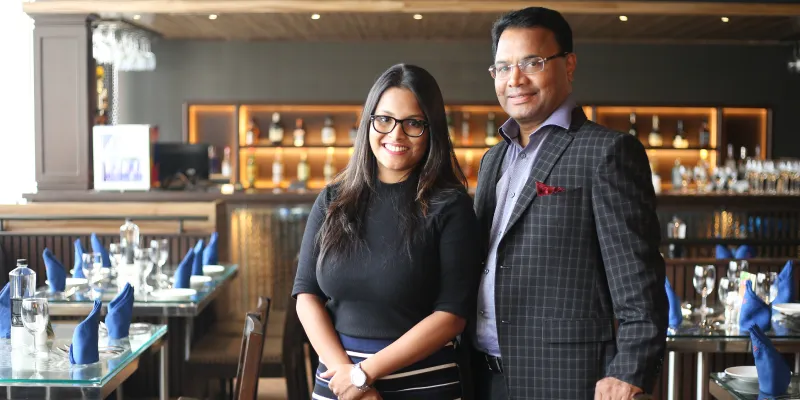He began by cleaning utensils in a canteen, now clocks annual turnover of Rs 75 Cr with food chain Shiv Sagar
Narayan T Poojari’s is a story worth telling. He came to Mumbai and did several odd jobs, including washing utensils at a canteen. Today, he runs the chain of Shiv Sagar eateries, which has 15 branches across 3 cities and employs 1,300 people.
It is said the enormity of your problems is nothing when compared to your ability to solve them.
Narayan T Poojari’s story tells us how grit, determination, and hard work can make take you places.
Narayan belongs to a small village, Gujjadi, in Udupi district of Karnataka, and comes from a poor family. He came to Mumbai at the age of 13 to make a living. He did several odd jobs, from working in canteens and hotels during the day, and then attended night school.

Narayan T Poojari, Owner of Shiv Sagar
How it started
The 1980s and 1990s was a time when food items such as idlis, pav bhaji, and dosas were gaining popularity. Narayan saw that there were not many players catering to this segment.
He did some research and felt that the idea of venturing into the business had merit. This is when he decided to launch an eatery. Narayan had no money, but found a partner who was ready to invest.
In 1990, at the age of 23, Narayan started Shiv Sagar with an investment of Rs 40 lakh in Mumbai’s Churchgate area. The partner exited the business the following year. Narayan, through his hard work, gradually climbed the ladder of success; from the manager of Shiv Sagar, he became a partner and soon owner.
Shiv Sagar soon became one of the most popular eating joints in Mumbai. Today, the business clocks a turnover of Rs 75 crore annually.
“Those days were different”, reminisces Narayan. Competition was not much like today. But they had to work hard to attract customers. Narayan says, “We made several changes and upgraded items to be different from what were already being sold in the market. We introduced several varieties in dosa items and included Indian pizza into the menu.”
While other Udupi restaurants would close at 7 or 8 pm, Shiv Sagar was open till 2 am and became popular among youngsters.
Offline marketing and more
Narayan recalls the days when there was no internet and how he came up with marketing ideas. He says he would give ads in several theatres in South Mumbai on a barter basis. An order value of Rs 1 lakh was exchanged with the local cinema theatres in exchange for six months of advertisement.
Narayan also stopped using steel plates and instead used Corelle plates (imported from the US) at the restaurant and soon started selling liquor as well.

Narayan T Poojari with his daughter Nikita Poojari
Second-generation entrepreneur
Narayan’s daughter Nikita joined the business in 2017 after completing her BTech. Her entry coincided with the expansion of Shiv Sagar.
Nikita says, “When I joined, we had launched a seafood restaurant called Fish N Bait in BKC. It was completely new and everything had to be built from scratch.”
Fish N Bait did not take off. Nikita says they invested a lot of money but the business was not able to generate enough profits and there was hardly any footfall. It was shut down a year later in 2018.
Nikita says, “We realised that a restaurant with bar or a casual dining concept works more than fine dining.”
Nikita changed the aesthetics of Fish N Bait and rebranded it as a premium, high-end restaurant Butterfly High. She says, “The menu was almost the same as we didn’t want to disturb the core of the chain.” This idea saw sales growing and more and more customers coming in.
Nikita also launched another arm called The Bigg Small Café Bar. She says “This was launched with the aim of going into Tier II and III cities.”
“We then came up with the concept ‘order big and pay small.’ This means the more you order, the lesser you pay. This has worked well for opportunities such as corporate lunches. We also give several offers under this,” Nikita says.
Market challenges
Narayan says that several people have tried to copy the brand by opening restaurants with names such as Shiv Home Sagar or Shri Shiv Sagar. He says, to prevent this, he has obtained an order from the high court barring others to use his brand name.
Today Shiv Sagar has more than 15 outlets across Mumbai, Pune and Mangaluru. Butterfly High and The Bigg Small Café Bar have one outlet each. In addition, the business has more than 1,300 employees.
Amid the expansion and diversification, how does Narayan maintain quality and hygiene standards?
He says, “I am very particular about hygiene. Sometimes I make surprise visits to the restaurants. I first go and check the toilet, then the kitchen. Agar yeh dono barabar milta hai toh manager safe hai, otherwise gaali milta hai usse (laughs). (If I find them in good condition then the manager is safe. Otherwise he gets it from me)."
All groceries and vegetables are sourced from local vendors and markets. Shiv Sagar has also hired corporate chefs to keep quality and hygiene in check. People who join the business are trained before they take up responsibilities.
The food and restaurant industry is extremely crowded today. Narayan says, “In order to survive, you have to keep reinventing yourself as per the demands of the market. Shiv Sagar’s USPs are good food, good hygiene, and good ambience.”
The father and daughter say they learn from each other. Nikita says she has learnt hard work, employee management, and keeping a check on sales among many other things from her father.
Narayan attributes success in online marketing and enhancement of brand value to his daughter. “Initially, when my daughter asked me to keep Rs 2 lakh aside for marketing, I would wonder why? But today I realise that before going to any restaurant people check its rating on apps like Zomato.”
The road ahead
Despite being a three-decade old brand, Shiv Sagar has not expanded beyond three cities.
Nikita explains, “All our restaurants are self-funded. The only way we can expand is by investing. We are also building a parallel team to strengthen the backend and make the expansion process smooth.” She adds that there are no plans to give out franchisees.
Narayan says the coronavirus pandemic is taking a toll on the business. “Fifty percent of the staff have left and gone to their native places. It has hit our business hard”. But everyone's hoping that better times are round the corner.
(Edited by Javed Gaihlot)









